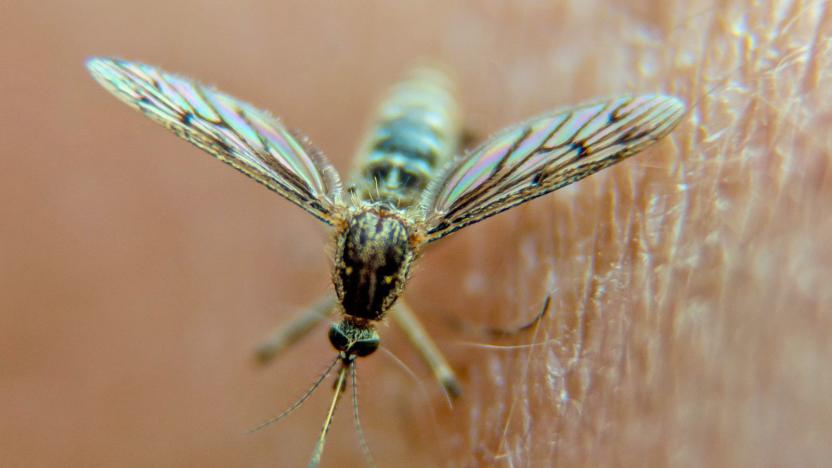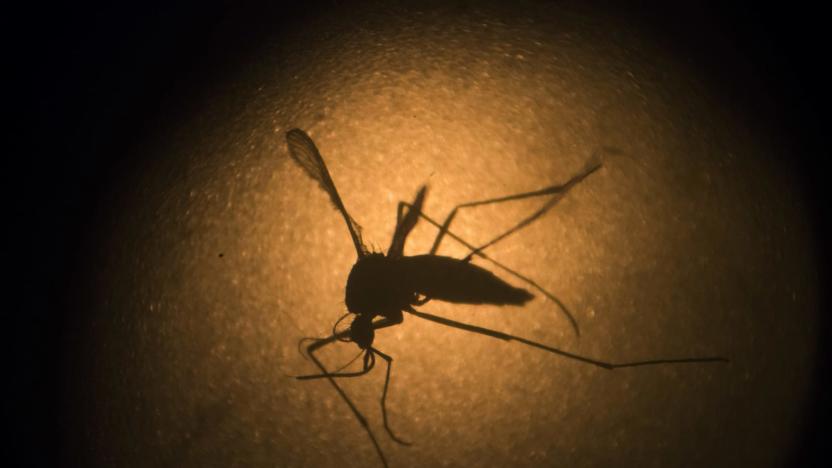Mosquitoes
Latest

Researchers use graphene-lined clothes to deter mosquitoes
Graphene, the highly flexible supermaterial used to build solar cells (and perhaps one day foldable phones), is also a powerful mosquito repellent. A team of researchers at Brown University discovered that graphene-lined clothing not only is an effective physical barrier to mosquito bites, the carbon-based material also changes their behavior. The study, which was published this week in the Proceedings of the National Academy of Sciences, found that graphene blocked the chemical signals that draw mosquitoes to other living beings in the first place.

Mosquitos are beating gene editing with rapid evolution
Gene editing and gene drives have the potential to be a massive scientific breakthrough, letting scientists target and eliminate diseases by modifying genes and disseminating them throughout a population. But it's also a technique that's not ready for prime time: There's a lot of work to be done to quiet critics and ensure that releasing gene-edited organisms into the wild will have the desired effect.

ICYMI: Genetically-modified mosquitoes are coming
try{document.getElementById("aol-cms-player-1").style.display="none";}catch(e){}Today on In Case You Missed It: Voters in the Florida Keys may have passed a measure to use bioengineered mosquitoes to combat the Zika virus and Dengue fever, but it's still a battle to get a community to accept the insects. The FDA has approved use of altered bugs that are designed to mate, which would then result in offspring that would quickly die. You can get caught up on the back-and-forth, here.

Alphabet is working to squash the Zika virus, too
There are a few ways to kill off a pest: eliminate its food supply, or, make sure it can't effectively procreate. Since the pest in question for this post is mosquitos, the former solution isn't an option. So, Verily, the life-science division of Alphabet Inc., is addressing the Zika-carrier with a spin on the latter, according to MIT Technology Review.

ICYMI: Targeting Zika with tech, flexi-cam and more
#fivemin-widget-blogsmith-image-547051{display:none;} .cke_show_borders #fivemin-widget-blogsmith-image-547051, #postcontentcontainer #fivemin-widget-blogsmith-image-547051{width:570px;display:block;} try{document.getElementById("fivemin-widget-blogsmith-image-547051").style.display="none";}catch(e){}Today on In Case You Missed It: Brazil is taking on the Zika virus by creating a smart billboard that attracts, then kills mosquitoes. Columbia University researchers built a camera prototype that takes pictures at a curve. And a Chinese company has stepped to Tesla with a self-driving, electric-only vehicle, though it isn't in production yet. Definitely share the latest in the Volkswagen emissions scandal with your friends who could use $5,000 (but might not get it); or just take in this performance from Prince as he was inducted into the Rock & Roll Music Hall of Fame. He was just so talented. As always, please share any great tech or science videos you find by using the #ICYMI hashtag on Twitter for @mskerryd.

'Gene drive' mosquitoes could end malaria once and for all
The scourge of malaria could be going away for good in some regions, thanks to a groundbreaking discovery by researchers at the Universities of California, Irvine and San Diego. Their study, published Monday in the journal PNAS, has reportedly uncovered a method that all but guarantees that specific gene sets will be passed to offspring.

Gene-modded mosquitoes will fight Dengue Fever in Brazil
The Brazilian city of Piracicaba has a potent new weapon in the ongoing fight against Dengue Fever, which infects more than a million people annually: genetically modified mosquito lotharios Created by Oxitec of Abingdon, UK and bred locally within Brazil, these GM mosquitoes (all of which are male) are designed to crash the local population before they can spread the tropical disease. More than six million have been released throughout Piracicaba since April. When a GM male mates with a wild female, his sapper genetics cause the resulting larvae to die before they can reach adulthood. What's more, the larvae also carry a genetic mutation that causes them to glow red under UV light, giving researchers an easy way to identify them on sight. "It gives an instant readout of how successfully you're driving down the native population," Hadyn Parry, chief executive of Oxitec, told New Scientist.

TED Talks mischief: lasers killing mosquitoes by the hundreds
Malaria is a huge problem worldwide, so it's no surprise to anyone that plenty of people spend lots of time trying to think of ways to rid the world of mosquitoes, prime movers of the disease. Nathan Myhrvold's company Intellectual Ventures Labs (and former chief technology officer at Microsoft) is focusing on just that. Using widely available and common electronics parts, Intellectual Ventures has made lasers which can kill mosquitoes mid-flight -- at a rate of about 50 to 100 per second. Myhrvold first publicly demonstrated this laser (which is made of parts of printers, digital cameras, and projectors) at the TED conference the other day, using hundreds of mosquitoes in a clear glass case to make his point. The laser's software determines the size and shape of the target before deciding whether or not to shoot, so, for instance -- it wouldn't take aim at a person or a bumblebee. The lasers could be used to protect hospitals and clinics in areas with high mosquito populations and in areas with a high rate of malaria infestation. Now, this is surprisingly not the first time we've seen such a trick -- though it is the first time we've seen video evidence of it working. There are some insanely informative (and murderous) videos at the source link. Be sure to check them out. Update: Video is after the break.

Scientists shoot down malaria-carrying mosquitoes with frickin' lasers
Seriously, is there anything a laser can't do? A team of mad scientists in Washington have concocted a system that could essentially eliminate malaria-carrying mosquitoes with lasers, and the whole thing can be built from parts sourced on eBay. The so-called mosquito laser is credited to an idea from Lowell Wood, an astrophysicist who worked with Edward Teller, the "architect of the original plan to use lasers to shield America from the rain of Soviet nuclear arms." In theory, at least, the technology could one day be used to draw a laser barrier of sorts around a village. Of course, the trick is to make the lasers powerful enough to smoke the bugs without harming humans -- any of you Earthlings up for a clinical trial or two?[Via eHow]





